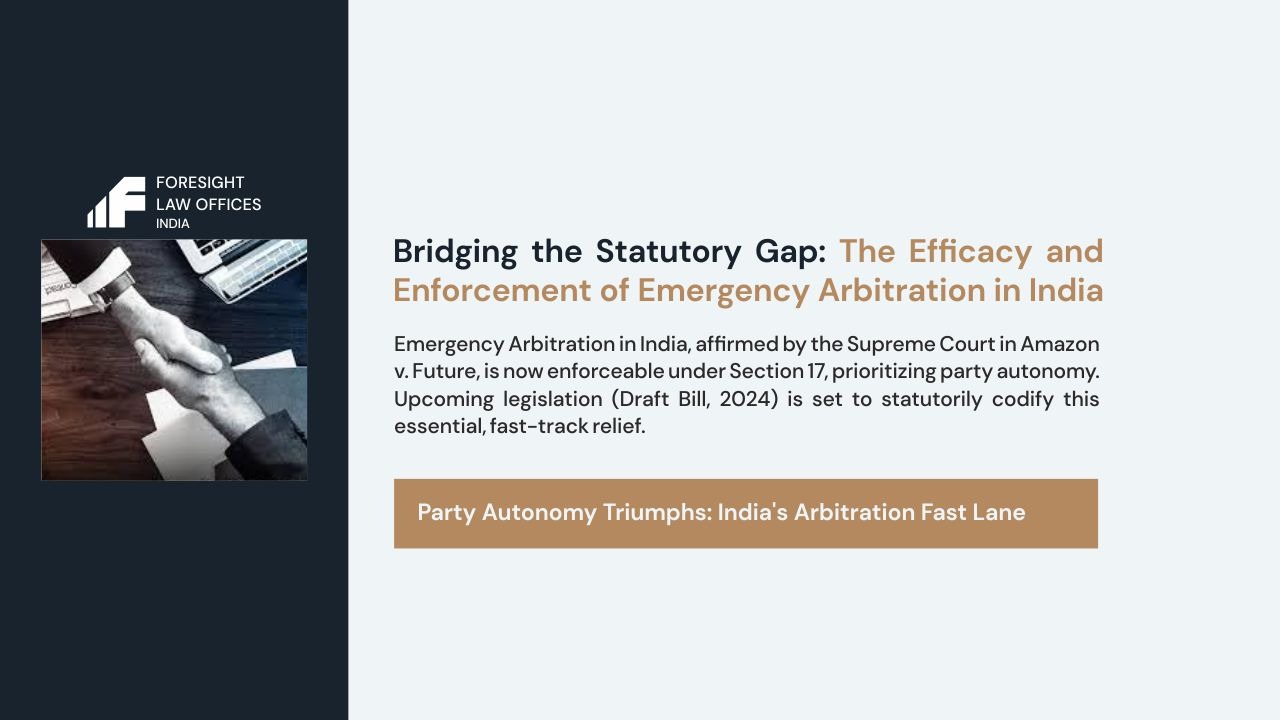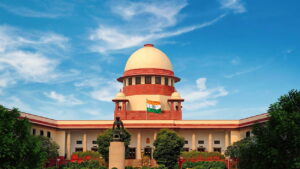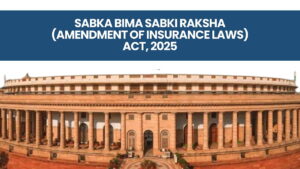The Race Against Time
The bedrock of commercial arbitration is efficiency, yet even the swiftest proceedings face a crucial vulnerability: the time lag between the initiation of arbitration and the constitution of the full arbitral tribunal. In high-stakes disputes, this window can be exploited to liquidate assets, alienate property, or otherwise frustrate the ultimate award. To prevent that, Emergency Arbitration is an efficient tool.
Emergency Arbitration is a mechanism that allows a party to seek urgent interim relief from a specially appointed Emergency Arbitrator before the formal tribunal is constituted. This process offers protective measures; such as prohibitory injunctions, asset freezing orders, or mandatory injunctions, to prevent irreparable harm. While widely adopted in international institutional rules (like those of SIAC, ICC, and LCIA), the concept initially had no explicit statutory backing under the Indian Arbitration and Conciliation Act, 1996 (the Act).
This legislative silence created a maze of ambiguity, which the Indian judiciary, particularly the Supreme Court, has had to navigate through progressive interpretation. As of October 2025, the legal landscape for Emergency Arbitration is defined by a landmark judicial victory for party autonomy and a significant legislative proposal aimed at providing statutory finality.
The Legal Labyrinth: Emergency Arbitrator and the 1996 Act
The Act, based on the UNCITRAL Model Law, was enacted without expressly contemplating EA. Its key provisions for interim relief are:
| Sections | What it says |
| Section 9 | Allows a party to approach a court for interim measures before, or during the arbitral proceedings, or at any time after the making of the arbitral award but before it is enforced. This remains the traditional route for urgent pre-tribunal relief.
|
| Section 17 | Empowers the Arbitral Tribunal to grant interim measures during the arbitral proceedings. Section 17(2) makes these orders enforceable as if they were orders of the Court. |
The central legal question surrounding Emergency Arbitrator was:
“Does an Emergency Arbitrator constitute an ‘Arbitral Tribunal’ under the definition in Section 2(1)(d) of the Act, allowing their order to be enforced under Section 17(2)?”
The 2015 and 2019 amendments, despite strong recommendations from the Law Commission of India to explicitly include “emergency arbitrator” in the definition of “arbitral tribunal” under Section 2(1)(d), failed to do so, leaving the matter open for judicial interpretation.
The Defining Judicial Landmark: Amazon v. Future Retail
The legal status and enforceability of Emergency Arbitration awards in India were decisively clarified by the Supreme Court in Amazon.com NV Investment Holdings LLC v. Future Retail Ltd. & Ors. (Civil Appeal Nos. 4492-93 of 2021)1. This high-profile dispute fundamentally reshaped Indian arbitration jurisprudence.
The Background of the Case
In 2020, Amazon initiated emergency arbitration proceedings under the Singapore International Arbitration Centre (SIAC) Rules in relation to a proposed sale by Future Retail Ltd. (FRL) to the Reliance Group, which Amazon claimed violated its contractual rights. The Emergency Arbitrator passed an order restraining FRL from proceeding with the deal.
Amazon then approached the Delhi High Court under Section 17(2) of the Act to enforce this emergency order.
The Supreme Court’s Rationale
The Supreme Court ultimately upheld the enforceability of the Emergency Arbitration order for India-seated arbitrations. The judgment rested on three pillars:
- Party Autonomy is Sacrosanct: The Court emphasized that party autonomy is the cornerstone of arbitration. When parties contractually agree to institutional rules (like the SIAC Rules) that explicitly provide for emergency arbitration, they are bound by those rules. The Court stated that parties cannot “wriggle out of a solemn commitment made… voluntarily, deliberately and with eyes wide open.”2
- Emergency Arbitration as an Arbitral Tribunal: The Supreme Court interpreted the definition of “Arbitral Tribunal” under Section 2(1)(d) broadly. Since the institutional rules (agreed upon by the parties) empowered the Emergency Arbitrator to act, the Emergency Arbitrator was deemed to qualify as an arbitral tribunal for the purpose of granting interim relief under Section 17(1).
- Enforceability under Section 17(2): Consequently, the order passed by the EA was held to be enforceable under Section 17(2) in the same manner as a court order. Crucially, the Supreme Court also ruled that no appeal lies under Section 37 of the Act against an enforcement order passed by a court under Section 17(2) regarding an Emergency Arbitration award, thus expediting the enforcement process.
This decision was a milestone, affirming that for arbitrations seated in India, Emergency Arbitration awards are binding interim measures and are enforceable under the Act, even in the absence of explicit statutory text.
The Continuing Lacuna: Foreign-Seated Arbitrations
While the Amazon v. Future ruling provided clarity for India-seated arbitrations (governed by Part I of the Act), a significant limitation persists for foreign-seated arbitrations (governed by Part II).
- No Direct Enforcement: Part II of the Act deals only with the recognition and enforcement of final arbitral awards under the New York Convention, not interim orders or awards.
- Recourse under Section 9: A party who obtains an EA order in a foreign-seated arbitration cannot directly enforce it in India. Instead, they must apply to an Indian court for interim relief under Section 9 of the Act. While the foreign Emergency Arbitration order may have persuasive value, the Indian court will independently determine the merits of the interim relief application, potentially leading to a duplication of effort and outcomes.
The Delhi High Court, in earlier cases like Raffles Design International India Pvt. Ltd. & Anr. v. Educomp Professional Education Ltd. & Ors. (2016 SCC OnLine Del 5521), had already highlighted this distinction, ruling that a foreign-seated EA order could not be enforced under Section 17. This divergence between India-seated and foreign-seated Emergency Arbitration orders represents the next major challenge for legislative reform.
The Legislative Response: The Arbitration and Conciliation (Amendment) Bill, 2024
Recognising that judicial interpretation, while progressive, lacked the certainty of a statute, the Indian Government introduced the Draft Arbitration and Conciliation (Amendment) Bill, 2024 (the Bill). This proposed legislation aims to solidify the position of Emergency Arbitrator within the statutory framework by October 2025.
Key Proposed Changes in the Bill
The Bill proposes two critical amendments to formalize Emergency Arbitration:
- Statutory Recognition (Section 2(1)(d)): The Bill proposes to amend the definition of “arbitral tribunal” in Section 2(1)(d) to expressly include an Emergency Arbitrator appointed under the rules of an arbitral institution. This provides the explicit statutory basis that was missing since the 246th Law Commission Report.
- New Section 9A: Enforcement Mechanism: The Bill proposes to insert a new Section 9A to specifically address emergency measures. This section confirms that an emergency measure granted by an Emergency Arbitrator shall be enforceable as if it were an order of the arbitral tribunal under Section 17(2). This formalizes the Supreme Court’s Amazon v. Future ruling and removes any remaining interpretive tension about the status of an EA order (whether it is an ‘award’ or a provisional ‘measure’).
- Non-Appealability: Consistent with the judicial trend to expedite relief, the Bill proposes to omit Section 9A from the list of appealable orders under Section 37, ensuring quick enforcement and reducing judicial delays.
A Brave New World for Institutional Arbitration?
The proposed Bill, once enacted, promises to elevate India’s status as an arbitration hub. It addresses the practical need for swift relief in high-value, time-sensitive disputes, particularly in sectors like infrastructure, where delays in interim measures can cause massive financial and operational damage.
However, a remaining challenge is the Bill’s limited scope regarding foreign-seated Emergency Arbitration orders. While the Bill recognizes EA for India-seated arbitrations, the mechanism to enforce foreign EA orders remains the circuitous route of applying under Section 9, a fact that still places Indian law behind jurisdictions like Singapore and Hong Kong.
The Path to Pro-Arbitration Certainty
As of October 2025, the journey of Emergency Arbitration in India reflects a robust and dynamic legal system. The Supreme Court’s pro-arbitration stance in the Amazon v. Future Retail case has successfully leveraged the principle of party autonomy to bridge a critical statutory gap, making India-seated Emergency Arbitration orders directly enforceable.
The proposed Arbitration and Conciliation (Amendment) Bill, 2024, is the next logical step, promising to codify these judicial principles and provide the explicit legislative certainty that commercial parties demand. By formally recognizing the Emergency Arbitrator and providing a clear enforcement pathway under the Act, the Indian government is sending an unambiguous message: India is committed to efficient, world-class dispute resolution.
This two-pronged approach, progressive judicial interpretation backed by imminent legislative reform—cements EA as a powerful and effective tool for securing urgent relief, ensuring that the wheels of justice, even in arbitration, never have to stop turning. The focus now shifts to the legislature to finalize the Bill and address the remaining divergence concerning foreign-seated EA orders, fully aligning India with global best practices.






